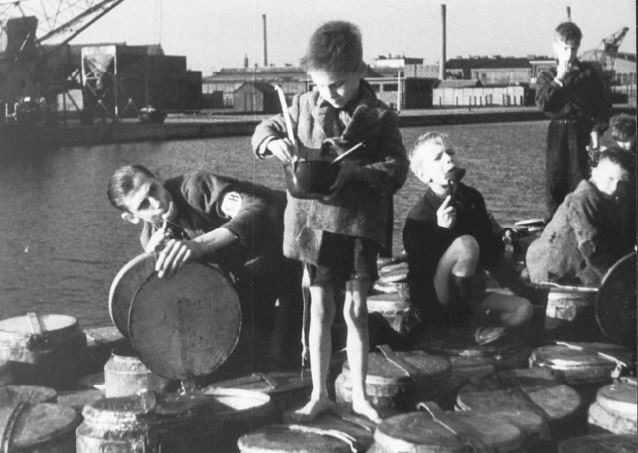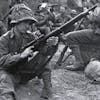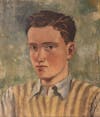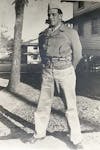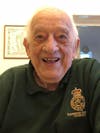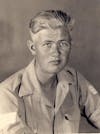80 Ukraine 2022 Appeal, & Dutch Hunger Winter
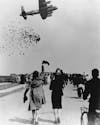
Refugee stories from WW2 and the Dutch Hunger Winter
Insights into the 2022 Ukraine crisis from 1944. Various family stories and an opportunity to donate to one of the several charities supporting the refugees.
Donate To Salvation Army Ukraine Crisis Appeal
https://bit.ly/FightingThroughSalvationArmy
Red Cross/ Disasters Emergency Committee
https://bit.ly/FightingThroughRedCross
Sources of news/discussion
BBC’s Newscast and Ukrainecast podcasts
Economist magazine podcast dated March 7
Full show notes, photos and transcript at:
https://www.fightingthroughpodcast.co.uk/Ukraine2022-Refugees
Reviews on main website
https://www.fightingthroughpodcast.co.uk/reviews/new/
Apple reviews - https://itunes.apple.com/gb/podcast/ww2-fighting-through-from-dunkirk-to-hamburg-war-diary/id624581457?mt=2
Follow me on Twitter - https://twitter.com/PaulCheall
Follow me on Facebook - https://www.facebook.com/FightingThroughPodcast
Operations Manna and Chowhound WWII

Interested in Bill Cheall's book? Link here for more information.
Fighting Through from Dunkirk to Hamburg, hardback, paperback and Kindle etc.
The Hunger Winter - Dutch children scrape food scraps from the refuse during the second world war
Fighting Through WW2 Episode 80 - Ukraine 2022 and the Dutch Hunger Winter, WW2
More great unpublished history! WWII
Links
Donate To Salvation Army Ukraine Crisis Appeal
https://bit.ly/FightingThroughSalvationArmy
Red Cross/ Disasters Emergency Committee
https://bit.ly/FightingThroughRedCross
Sources of news/discussion
BBC’s Newscast and Ukrainecast podcasts
Economist magazine podcast dated March 7
INTRO
Hello again. I’m Paul Cheall and I wish you a warm but wintery welcome to the Fighting Through wwii Podcast. I’m cutting out any formalities on this episode because it’s a bit of a one off about Ukraine.
Events in Ukraine have created a refugee crisis in Europe at a scale not seen since the Second World War, when – Wiki - Mass evacuation, forced displacement, expulsion, and deportation of millions of people took place across most countries involved in World War II. The mass movement of people – most of them refugees – had either been caused by the hostilities, or enforced by the former Axis and the Allied powers based on ideologies of race and ethnicity,
At least 2.6 million people have fled the country since February 24, and according to the United Nations the total could top 4 million.
Today I’m going to give you a few insights into dads experiences during the war where support from third parties was so welcome, and that is part of the theme for this episode. And I’ve got a very timely family story about the Dutch Hunger crisis in WW2.
To end the show I’m going to change tack and bring you a modern story of adventure about someone stranded on the French mountain tops overnight and how they survived. It’s a bit of escapism, nonetheless true, to help take our minds off the horrendous goings on over in eastern Europe.
So:
This is a very special episode to acknowledge the situation in Ukraine. If anyone, anywhere in the world, is unsure about the realities of Russia invading Ukraine with tanks troops helicopters and planes then you shouldn’t be in any doubt. It is reported by respected sources to be happening now.
There are plenty of independent postings on the internet showing some of the action and violence going on out there and of course BBC, Sky and CNN are reliable sources.
And the BBC’s Newscast and Ukrainecast podcasts are also excellent sources of information and deeper debate. If you want additional insight you could also check out the latest excellent Economist magazine podcast, March 7.
Right now I want to make a plea for you to make a donation to one of the charitable causes Which are supporting the millions, of refugees streaming out of Ukraine into the various Baltic countries, majorly Poland but also Hungary, Slovakia, Estonia, Moldova and Romania and increasingly Western Europe.
I am particularly impressed with the Polish nation for being foremost in helping these poor people, taking in over a million refugees. In this podcast they’ve featured several times in the past offering support to Prisoners of war and Episode 29 about Brian Asquith as a British pow is a great example of that.
It’s about a British POW in Poland and how he survived the war to tell the tale, in no small part due to kindnesses offered by the Polish people.
I’ve personally made donations to the Red Cross and the Salvation Army both of whom are doing work out there. And I’m putting links in the show notes for your convenience.
You will have heard me mention these charities on occasion in previous episodes and I know Dad in particular held the Salvation Army in high regard. Here’s a passage from dad‘s book about the refugee situation he found himself in, in Germany, at the end of the war when he was in the regimental police in Hamburg and the surrounding area.
Dad – Refugees - ww2 memoirs
Dad is corporal in charge of the regimental police in war-torn Germany in 1945. He regularly tours some of the cities like Hamburg, Düsseldorf and Essen helping to keep the peace. They’ve just been given the green light to actually interact civilly with the German population.
“When the fraternisation ban was lifted, it was much more agreeable to be able to
pass a civil word to people who would say the odd word of greeting, but in English
of course. I never got close enough to them to be able to learn any of their language,
except the time of day. Most instructions I had to give during the course of my duties
were given in sign language and I did not have any problems in that respect. They
had been our bitter enemies for too long to be forgiven so quickly. It would have to
be seen whom the victors were without any signs of aggression on our part and that
is how we behaved, going about our responsibilities quietly and purposefully.
.
I visited Hamburg several times on duty and the destruction was unbelievable
with a complete collapse of large areas. Hamburg, alone, paid the penalty for the
suffering of Coventry. It had been avenged.
There was never a dull moment for me and there was always interesting work to
be done. One of the most distressing of those tasks took place over a period of three
full days. The police had to accompany six officers on a very unpleasant duty, but
at the same time giving us first hand insight into what had taken place in Germany
over the past years. We went to a large field about four miles from our billets, and
what we saw had to be seen to be believed. There were literally many thousands
of displaced persons standing around with vacant, hungry looks upon their faces,
waiting for somebody to guide them and to tell them what was being done to help
them. There were other people, half-witted because of their experiences. None
of them seemed to know where their families were; all were undernourished,
underclothed and altogether a tragic sight. Those poor souls had been uprooted
from their homes and families forcibly, from all over the occupied territories, and
made to contribute every sinew in their bodies to the German war effort, by their
forced labour in the factories.
We set up trestle tables and an officer, together with a linguist who spoke several
languages, sat at each table. We police had to keep order and organise the poor souls
into single file to wait their turn to seek a solution to an extremely difficult problem.
It was all done by signs on our part because of the many languages involved, but that
was no problem since most of them were docile, being well-behaved, and just stood
there wondering what on earth was to happen to them, as if in a trance. I was at a
table all day, for three days, listening to the very patient officers asking questions,
all beyond my comprehension. I thought how marvellous it was to be a linguist,
watching those clever men, with their voices and signs, trying to get to the bottom
of so many problems.
The people came from so many different countries and to me it looked an
impossible task. Those people wanted to return to the homes which they had been
forced to leave, but it was easier said than done. Their minds must have been in
torment. It was a monumental task which had to be done as quickly and humanely
as possible but, meantime, they had to be fed and protected against any one of them
who had gone berserk. We had to show sympathy, kindness, firmness and above
all, understanding of the needs of those poor individuals who longed to get back
to the folk they expected to find waiting for them. What a tremendous upheaval of
humanity the Nazi regime had brought about in their determination to subjugate
the once great nations of Europe. It was a marvel that it was ever sorted out, but for
many a poor soul it never would be.
Being a witness to what happened over those three days was something I will
never forget. But for that heaving mass of tragic humanity who paid the penalty
with their mental and physical suffering it would be an almost unbelievable burden,
which they would take to their graves. The Allies did a monumental job here and the
countries should be forever grateful.
I was pleased I had joined the Regimental Police because my duties enabled me
to see, first-hand, the aftermath of war in Germany, which I would otherwise never
have seen, or even believed. I also came to realise that not at all Germans wanted the
war with all the consequences which had been forced upon them by a ruthless and
heartless dictatorship.
Well you can take whatever message you like from that passage and whilst it’s not directly comparable with the situation being faced in Ukraine, you can nevertheless bet that there are plenty of instances of suffering which we can’t possibly begin to relate to yet still deserve our compassion and support .
So, with that in mind I ask that you consider making a donation to one of the many charitable appeals which are out there at the moment. There are a few links in the show notes which will help you. And I’ll give you a few details later in the show.
Family story – Bus - best military history podcasts
I’m only sharing one family story in this episode because I’m trying to keep it focused. I wasn’t going to do any until a serendipitous email I had from Bus from Amsterdam about the Dutch hunger winter during WW2.
Firstly Bus, short for Sebastian said:
I discovered your podcast a couple of weeks ago and I think it's my healthiest addiction so far.
Thanks for keeping me company during long walks through Amsterdam, kilometers of cycling through Dutch countryside and long drives home from work.
My grandmother's name was Afra Schouten-Ruijter.
“She lived in Middenbeemster on the Dutch countryside. She started her diaries at the 1st of january 1945, which is called the Hunger Winter in Holland.
Listener Before we go any further I’d like to give you a little bit of backstory to the hunger winter, courtesy of Wikipedia.
The Dutch famine of 1944–1945, known in the Netherlands as the Hongerwinter was a famine that took place in the German-occupied Netherlands, during the winter of 1944–1945, near the end of World War II.
A German blockade cut off food and fuel shipments from farm towns. Some 4.5 million were affected and survived thanks to soup kitchens. There were roughly 20,000 deaths.
The famine was alleviated by the liberation of the provinces by the Allies in May 1945. Prior to that, bread baked from flour was shipped in from Sweden, and there was an airlift of food by the Royal Air Force, the Royal Canadian Air Force, and the United States Army Air Forces – under an agreement with the Germans that if the Germans did not shoot at the mercy flights, the Allies would not bomb the German positions – all this helped to mitigate the famine. These were Operations Manna and Chowhound. Operation Faust also trucked in food to the province.
Bus continues:
Grandmother writes about her beloved uncle Jan Ruijter and his son Yoris who were taken by the nazi's.
They were in the Dutch resistance and were betrayed by someone. They were eventually shot in the Dutch dunes on the infamous
Waals dor perv lakte, where a lot of Dutch people were shot.
My Grandmother made sandwiches for people who had walked all the way from Amsterdam (40 km) to get some food for their children at home because there was none in the city.
She writes about a friend taken to labour camps, with some returning - but some didn’t.
She wrote a passage on the liberation as well. The parties, the canadians entering town and the traitors being walked through the village.
At one point there is a young german soldier trying to flirt with her when she was knitting socks on the steps at the front door of the house and she writes something about him having to f*** off and giving him the good old finger.
Besides all that there are some personal stories of a young 17 year old girl who wanted nothing but a normal life, dancing, ice skating, and not going to church haha..
Groeten uit Amsterdam
Bus
Bus thanks so much for sharing this which is only an overview of your grandmother’s diary. But my goodness how much emotion there is packed into such a short passage. I have to say I shed a tear when I read it.
Bus is exploring getting the full diary translated from old Dutch into English and my goodness if there’s ever any more to share I’m sure you’ll hear about it on the Fighting Through Podcast first! Good luck Bus and thanks again.
You know I especially liked the irony of Bus’s grandmother telling the German soldier in no uncertain terms which way to go home because that’s become something of a catchphrase amongst the Ukrainians during the recent war.
I feel quite exhausted reading that … and the parallels between what Bus’s grandmother experienced and what the poor people of Ukraine are going through at this very moment is uncanny. So on that note please do donate directly to one of the links in the show notes. If every listener donated £10 that could raise as much as £60,000 to help support these poor homeless Ukrainians. I’ve tagged the links so I’ll at least be able to tell you how many people donated.
Don’t forget that No matter the amount, your donation could reach someone in Ukraine when they need it most. It could be food, clean water, or a safe place to sleep for a family. It could be their lifeline.
Here are some choices
The Disasters Emergency Committee, DEC, is a coalition of 15 leading charities, and is providing emergency aid. The funds are being used by charities inside Ukraine and at its borders to provide people fleeing the war with food, water, medical assistance, protection and trauma care.
The British Red Cross is part of the DEC and is raising money for those still in the country as well as those leaving. Their teams have already been distributing warm clothes and sleeping bags – both absolute necessities. But it’s forecast that this cold weather might stick around for a while, so, to help protect people from the freezing temperatures, they’re also providing specialised items, like thermal blankets and insulated tents.
And this is what the Salvation Army are saying on their website: As the conflict in Ukraine escalates, The Salvation Army already has people on the ground providing food, shelter, clothing, prayers and hope.
The Salvation Army has programmes and personnel in Ukraine, Russia, Poland, Romania, Moldova and other European countries who were able to offer practical assistance as soon as the violence escalated.
Some rushed to the border of Ukraine to hand out urgent provisions, while others made arrangements to offer support to Ukraine’s people seeking shelter in their country.
In particular, The Salvation’s Army’s response includes:
Romania has formed an emergency team, filled the car with essential items and travelled to the border to offer support.
Moldova will provide free assistance to Ukraine’s displaced people, including temporary accommodation, hot meals and drinks, access to Wi-Fi and other necessary items.
Poland is preparing relief parcels for Ukrainian people coming into the country.
Slovakia is preparing to offer accommodation, food and drink, and emotional support.
The Czech Republic is already home to some 200,000 Ukrainians and anticipates many more of them will seek help from family and friends already in the country. The Salvation Army in Czech Republic has available capacity in residential centres, so they stand ready to provide support.
The Salvation Army in Ukraine reports that officers are sleeping in shelters alongside the communities they serve, but doing their best to offer hope and support.
If you want to donate to the Sally Army UKRAINE CRISIS APPEAL – there’s a link in the show notes amongst others.
Please do your best to support these charities. There are links in the show notes.
Family stories 1 Ruud WW2 memoir
Operation Manna.
A bit of input from Ruud Schermer from the Netherlands about Operation Manna. This was a food supply operation carried out by Bomber Command. Manna was carried out by British RAF units, as well as squadrons from the Australian, Canadian, New Zealand and Polish air forces, and the 8th USAAF (“Operation Chowhound”).
The winter of 1944-1945 had left the Dutch starved and many died of cold and lack of food, especially in the cities.
The operation took place May 1945, with permission from the German occupiers and resulted in many consecutive days of food droppings in the Western part of NL, which had by then been sealed off by the Allies from the rest of the (liberated) country.
Ruud explained further
The spectacular part of the op was obviously the food supply by air (my mum (Ruud’s) told me how utterly astonished she was by the size of the bombers as they flew in at low altitudes) it was a super moral uplift for the people. But the majority of the food supply came by lorry and by barge. My in-laws both lived on a barge and went through the war as kids. Both families were involved in shipping food through the lines to the sealed off parts of Holland.
Interestingly, the operation continued for days after the capitulation of the Germans, since it took time for the Canadians to move into the zone of occupation and get things organized there. Even after that quite a few people died from months of starvation, which actually started when the Dutch railways started their strike on 17-Sep-1944 in support of operation Market-Garden.
The Germans retaliated by shooting railway personnel and by not allowing food transports. When winter came lots of stocked food was gone, which led to mass starvation and people from the cities going out to the farmers to get food. Local food distribution petered out to starvation level.
The situation seriously deteriorated and Dutch resistance tried to negotiate food supply to the sealed off area as early as March, but the Germans would not budge. Only when the war actually appeared to be lost did they consent.
BBC 1 Kloppenburg - ww2 history
People in story:
Mrs Theodora M Nuze Nee Kloppenburg
Location of story:
Arnhem and Holland
I was a teenager and lived in Arnhem in Holland and on the 10th May the Germans came into Holland and from then on we were under German occupation. On the date of the Bridge Too Far — the 16th September 1944 there was a battle going on but the South of Holland was free but the centre and the West was still occupied. It was called the Hunger Winter. There was no food left and people were starving. We were evacuated from Arnhem into the West and that took 9 months. After the war was over in the May when Hitler was dead we were able to go back.
For 5 years everyone was hoping the war would be finished, so we were full of ambition, And whatever sacrifice we went through, we thought it would be worth it to be free. We had nothing but in the end we didn’t mind as we were free.
On the 16th September 1944 we were told at 10 o’clock in the morning by a bulletin that the town had to be empty by 6 otherwise you’d be shot — whoever you were. My mother couldn’t walk as she was an invalid and it was hard getting out as the Germans took everything — bikes and cars. So we needed to get my mother out. We went to the greengrocers and got a wheelbarrow and took her out that way. We had to walk 7 miles and we stayed with friends just outside of Arnhem. After a fortnight more bulletins went up and the evacuees were told to leave. So for 3 days we walked to the West and along the way we had to sleep on floors in factories. As we made our way, there were between 6 and 7 horses and carts and they were full of people who were unable to walk, my mother was one of them but my father, sister and me all had to walk. Planes came above us thinking we were a German convoy but we waved our white flags at them and then they realised we were evacuees. At the time everyone thought it would only be for a couple of weeks but that turned out to be 9 months.
The Hunger Winter was terrible. There was no food, children used to go through bins to find something to eat. In the night you could hear children going to the farmers trying to get food, you could hear them walking. One time it was early in the morning and a boy was out walking with a little buggy and it was covered up. They said to him “you have done well, what have you got?” and he took the cloth off and it was his mother, collapsed as she was too weak to go to the farms to get food. That happened a lot!
When we were evacuees my sister and I stayed with some hairdressers and my mother and father stayed with some other people, they had to take in evacuees there was no choice for people. And my brother went to church and he had paces to hide from the Germans as he was little.
You weren’t allowed radios, you couldn’t read newspapers. The only news you got was if anyone had a quiet radio and you got news from England. Then it had to be secret. You could pass the news on but very carefully. My brother was once stopped by the Germans, he had nothing on him, they questioned him but let him go.
Sometimes the Germans came into homes looking for young men to take them way. So the word was spread as much as you could and then they hid the men as best they could but if they were found they were taken away. Luckily they didn’t find my brother as he was hiding in the church.
My brother in law was taken by the Germans and asked why he wasn’t working for them; my brother in law said “What! I will never work with the Germans”. So he was taken off and had to dig holes. He made out he had mental problems and caused all manor of trouble. The Germans said he wasn’t worth having so he escaped. He walked miles and miles to get back to us. He was only away for between 3 or 4 weeks but by the time he had got back to us his head was full of lice, he had a beard and he was dirty as nothing had been washed.
As we came back into Arnhem the Germans had been organising taking everything good out of the homes to take back to Germany but they must have been disrupted as when we went back things were left on the footpaths. I remember seeing a row of sewing machines outside in the street. We got ours back but it was rusty as it had been out a long time.
My father had a hair dressing shop and because he had a shop we were one of the first to be allowed back into Arnhem after the war. We had no food, but very slowly as the businesses came back in life carried on. The Swedish Red Cross had a kitchen there for the first few weeks so we were able to eat. The city of Arnhem was ruined by the Germans.
Also all the girls who were friendly with the Germans during the occupation were gathered up by the police. They had their hair shaved off and they were sent to prison — I think to camps in Germany.
BBC 2 – Otto Snel - WWII history
Contributed by
OttoSnel
Rotterdam, Zuid Holland, The Netherlands
I lived in Rotterdam in the Paul Krugerstraat just around the corner from a harbour, the Maashaven. German bomber planes pounded the harbours at the beginning of WW2 and I remember sitting at the bottom of the stairs for days, warmly wrapped in a blanket, whilst the bombs rained down not far away.
The German occupiers' punishment was quite severe when the Dutch underground resistance movement killed a German soldier. They would choose twelve people at random, women, men, children, put them against a wall and shoot them. The bodies were left on the pavement for a few days. I was lucky enough to escape such a punishment. I was walking on the street when I heard gun shots, when I turned the corner I was just in time to see the German soldiers get into a vehicle leaving the bodies on the pavement.
The 1944-5 winter was an extremely cold one. Food provisions were minimal. The German authorities decreed that bakers had to provide 200 grams of bread per person per week. The bakers did not have enough wheat and simply made up the weight by adding water. The 'bread' stuck to the palate and had to be scraped off with finger nails. Sugar beet soup was on the menu and, I was told, tulip bulb soup.
The Red Cross arranged with the German authorities to alleviate the hunger by a food drop. I recall the sky littered with bombers dropping food parcels attached to parachutes. An unbelievable sight.
My mother received one can of food, a loaf of bread and margarine. The can was a beautiful copper colour, I can see it to this day. It contained finely mashed potatoes, finely mashed carrots and finely mashed meat. Specially formulated for stomachs that could not digest properly. It was the greatest meal of my life. Then my mother, sister and I ate half of the loaf of bread. The other half my mother put away, 'For tomorrow', she said. Came tomorrow, the bread was mouldy and not edible. Many years later I learned that the bread was baked in Canada weeks before the drop and put into deep freeze. I learned a lesson at the age of 7: Don't put off till tomorrow that you can enjoy today!
I remember a German soldier walking down the street with a loaf of real bread under his left arm. He gave a slice of bread to each child he saw. I suppose he must have been distressed by the hunger he saw around him.
Water and electricity supplies were for a limited time each day. Illumination at night could only be had by those lucky enough to possess a bicycle (the Germans had been confiscating metal for a year or so). The cycle was put on a pedestal in the living room. Each member of the family would in turn pedal away, free wheeling, with the dynamo on the front wheel producing just a little voltage to power the 6 Volt head lamp on the bicycle.
In the hunger winter my mother and the neighbour, Mrs Hontele, a devout Roman Catholic with eight children, decided that food had to be obtained somehow. My mother volunteered to cycle to Zeeland with two sheets and pillow cases to exchange for food (paper money had no value). On the way she hid from German soldiers who were confiscating anything made of metal. The journey took days. My mother got one bag of potatoes in exchange, half of which was stolen from her on her return journey by equally hungry fellow Dutch people. The two mothers decided that they would eat the boiled potato skins, the children ate the potatoes. They were very sick, their stomachs just couldn't digest the potato peels.
My father was a member of the resistance movement, caught and sent to a sort of concentration camp. My uncles and most other men were ordered to work in German labour camps. There were thus not many men about from 1943/4.
We lived on the second floor. My mother and Mrs Hontele were looking out of the window overlooking the street when Mrs Hontele exclaimed 'There goes Mr Williams, the piano tuner. He's going to Mrs Johnson. But she hasn't got a piano'. My mother looked at the neighbour, hissed 'Shhhhhhhhhhhh' and then shook her head in my direction. I didn't have a clue what it was all about at the time but many years later I realised the man was having a very good time. He probably wished the war would never end. I guess he was a Dutch collaborator. On liberation day, 5th May, 1945, his head would have been shaven clean and a swastika painted on it.
On my father's return he received a letter thanking him for his contribution to the resistance movement. It was a printed letter, simply addressed to 'Dear Sir' with the printed signature of Prince Bernhard (of German descent, husband of Juliana both of whom spent most of the war years in Canada). My father was extremely angered by the callous letter. He tore it up proclaiming 'I'd never do it again, if that's what they think of what I've been through'. It was the one and only time I saw him in anger. He never spoke of the war again.
Mike Still memoir
Here to finish the show now is some lighter listening, nothing to do with war or fighting and famine, although the hero of the story did get quite peckish at one point.
This is a super story of adventure in the French alps about an ordinary guy I once met who’d had the most extraordinary experience of surviving up a snowy freezing cold mountain.
I met Mike Still on a skiing trip years ago.
Here’s his incredible story.
This is:
One mn’s story of survival in the Alps or:
Avoiding a wipe-out in a white-out
By Mike Still
It isn’t much of an excuse. But I probably would never have begun that crazy skiing
journey if the lift man — high in the French Savoie “Three Valleys” mountains — had not urged
me on. ‘Oui, Mottaret direct – La”
He pointed through the white-out to a chequered pole marking the start — and only
the start — of a far-from-easy off-piste route to Mottaret, part of Méribel. There, if I
made it in time, I would take lifts back to the mountain above Courchevel. where I was
staying.
Foolishly, I decided to go for it. Skiing blindly in steep, fresh snow, I didn’t see another
marker pole — or the crevasse — until my ski-tips went out over it. “Stop!” I yelled to
myself.
Reversing gingerly from the edge, I tried climbing back. But a few struggling steps
showed me I would never make the top, even if I could see the way. Nothing to do but
stand and wait. Surely the ski patrol would come down soon, at the end of the day. No,
of course this was off-piste, and unpatrolled.
I remembered listening to a man who liked to go off into the Cairngorms, digging snow
caves for the nights, but I quickly dismissed that thought and went on peering into the
blankness, imagining the swish of approaching skis.
But nobody came. And, half an hour later, I knew that nobody would. By then all lifts
had stopped running. There were two options:
Ski on blindly to Mottaret and hope to hitch or get a taxi to Courchevel (about 20
kilometres): or dig a snow cave and hope to survive the increasing cold until the
weather cleared (a tall order at some 2,400 metres).
The first was obviously suicidal. The second was ridiculous, but certainly possible.
Alternatively, there was the chance that someone, somewhere, might hear if I shouted
loudly. But the only reply was my echoing bad French — and the low-pitched moan of a
northwest wind. That was when I shivered.
More to warm myself than anything else, I drew a straight line across the slope, facing
the wind-driven snow flakes. I then I removed my skis and, using one as a spade, drove
it vertically into the line. Repeating the process, I dug out slabs of firm snow until I was
standing on a flat area, facing a wall a metre or more high. I was out of the wind.
Next, I marked an arch on the wall: a structure this shape would he less likely than a
square one to collapse on me. I dug non-stop until the cavern was more than a metre
long.
It was now 7.30 pm - less than an hour to dark, I guessed. I lay down inside and found
that my legs, even drawn up, remained outside. digging in further would mean long,
slow manoeuvering in dumping the snow blocks. Besides, the thought of being
completely immured was appalling. The remaining part of the cave would be an igloo, I
decided.
Outside, shivering violently, I propped my two-metre skis at an angle from roof to
ground, as far out as possible, and dug them in. Across the skis I laid the poles, burying
the ends in the snow banks on either side. I wanted to leave an entrance low at the
front. But I needed to build up snow blocks from there. No time for clever design
thinking; the white-out was turning grey, and it was now much colder at sundown. So I
stood up through the framework and stacked snowblocks, from the front and side
banks. They seemed to fit like a jigsaw. The final hole was a problem, as I hadn’t left a big
enough block within reach. But I partially closed it with my empty backpack, once I was
squatting inside. And that was when, quite suddenly, darkness fell.
Spring skiing can often mean rain. I’d brought a plastic mac for low-level walking. I lay
on it in my “room” in Col de La Chambre. The relative warmth quickly left me and I
shivered in unrelieved spasms. The snow-cave man had stressed the importance of
routine exercise. After some experimentation I found a position that worked. But
first, I lay on my back and drummed my heels. This warmed my legs. ButTorso and arms
shivered. So, with knees drawn up, wet-gloved hands clamped in armpits, I
emulated a strait-jacketed escapologist. I knew this routine would be non-stop for the
duration. Sleep was out.
It was now dinner time. Strangely, I felt no hunger, though it was eight hours since I
had last eaten — two rolls and an apple. I had kept a can of lager — and I was thirsty —
but it needed warming inside my anorak because it had frozen solid.
I speculated upon the reaction in the chalet in Courchevel. Had the chalet girl rung the
police, who had called the ski patrol? Wasn’t that the hum of a Sno-Cat coming up the
mountain, powerful lamps perhaps seeking me out? I stood up and peered into the
darkness. But there of was only the cutting wind’s moan, and the patter of hard little
snow flakes.
I found the movement the most warming yet, though I couldn’t withstand the cold for
more than two minutes. So I alternated “indoor” exercises with look-out spells every 10
minutes.
It was about 2am when I saw the first star. Climbing through the look-out hole I saw the
silhouette of a mountain, too. Eerie, diffused light poured up the valley behind it. I knew
this must have come up from Mottaret. Then complete darkness again; no, not quite —
the stars remained, perhaps enough light to venture walking.
I knew that moving out would, when I removed the skis, destroy half my shelter. So I
waited another five the minutes to be more sure of a lasting clearance before loading
my backpack and kicking the igloo out from within.
Walking was painfully slow and I sank thigh-deep at almost every step, but I could see
quite well now, though not well enough to discern if there were any ski-tracks to follow. I
put on my skis and was surprised to find that they stuck to the snow — iced up from the
igloo, they had to be pushed, even straight down the fall line. Poking the snow ahead
before each step for sudden drops. I made slow, safe progress — until, as the ice came
off, I began to pick up speed down a steepening gradient. I made two short swings and
stopped, at a cliff edge.
I stood in a cleft between two knolls. In front of me, beneath a drop neither the depth nor
gradient of which I could discern, lay a smooth, white expanse. I thought that if I could
reach that, it would be easy skiing to Mottaret. Teetering momentarily I all but started
down towards the snow field. But I thought better of it and clambered back. Then I saw
a hut on one of the knolls.
The hut was locked. Frozen banks of snow blocked the narrow balcony. I hacked out a
level area close to the woodwork and lay down on my upturned skis, my plastic mac
over me, hoping it wouldn’t be too long to daybreak. It was 3am. The Milky Way,
occupying what seemed a quarter of the sky, was itself blurred by literally clouds of
planets and stars. There was almost constant movement. Comets darted incessantly,
sometimes for huge distances; others came and went in an eye-blink. The “sleep” that
followed was never without an acute awareness of shivering.
At 5am the rising sun shone straight into my eyes. Stiffly, I climbed hack upward.
Following the stone-hard, rutted track, I found that the “snow field” on which I had so
wanted to ski in the night had, in fact, been a cloud top. Now it had disappeared to leave
a 30-metre drop. But I was lucky. Clambering back up, within about 50 metres I found
ski-trails; they turned sharp left, dropping behind the hut knoll, where I had gone straight
down.
In a matter of minutes, as I skied down the rocky trail, I came upon a Sno-Cat. “Ca
va?” inquired the driver. You OK? I told him what had happened. He must have radioed to
Mottaret; for Marie, assistant manager Securité des Pistes, welcomed me to the staff
restaurant, where the chef kindly served me a hot cooked breakfast I shall never forget. To make a
fool’s reward complete I was given a gIeaming Trois Vallëes badge. and informed that,
the previous season, four other skiers stupid enough to venture out alone and without a
guide had not been as lucky.
Mike Still
Please donate to the humanitarian charities supporting Ukraine. Now.
No matter the amount, your donation could offer real support to someone in Ukraine when they need it most. It could be food, clean water, or a safe place to sleep for a family. It could be their lifeline. And how good is that.
If you’ve enjoyed this episode of the Fighting Through Podcast please give a few pounds or dollars now. So that’s the Red Cross, Salvation Army or any of your own chosen charities.
There are links in the show notes.
On behalf of myself and my late Dad
Thank you so much
Links
Donate To Salvation Army Ukraine Crisis Appeal
https://www.salvationarmy.org.uk/news/salvation-army-mobilises-support-ukraine-relief-effort
https://bit.ly/FightingThroughSalvationArmy
Red Cross/ Disasters Emergency Committee
https://donate.redcross.org.uk/appeal/ukraine-crisis-appeal
https://bit.ly/FightingThroughRedCross
Sources of news/discussion
BBC’s Newscast and Ukrainecast podcasts
Economist magazine podcast dated March 7
Featured Episodes
If you're going to binge, best start at No 1, Dunkirk, the most popular episode of all. Welcome! Paul.
PS. Just swipe left to browse if you're on mobile.










